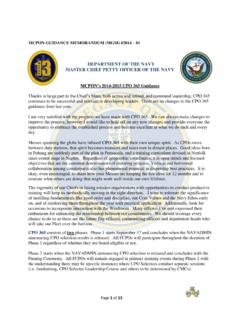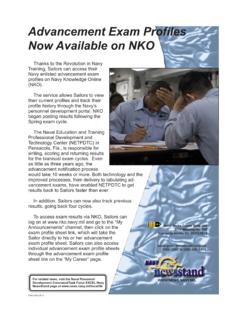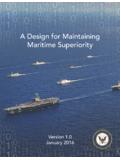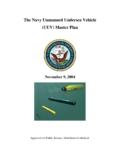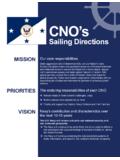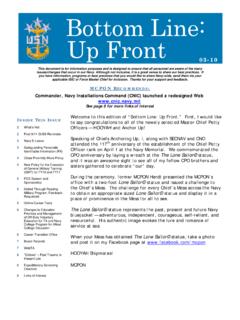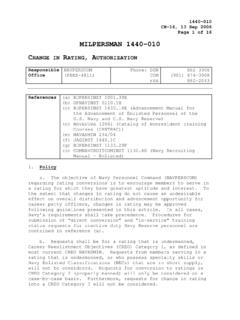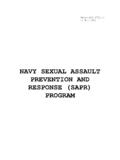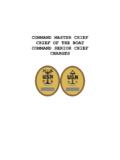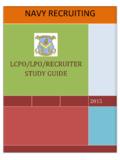Transcription of A Guide for Leaders CPO 365 Training - United States Navy
1 brilliant on the basics A Guide for Leaders CPO 365 Training Our people are our greatest strength. Our job as Leaders is to ensure every Sailor knows that we want them to succeed, and that we value their service, talent, skill, and dedication. We must make every effort to prepare our Sailors for success from Day One, and to continuously create the right conditions for that success being brilliant on the basics creates a solid foundation upon which every successful career is launched and provides a road map for success. In many cases, these efforts are the command s first opportunities to prove it cares about the well-being, professional success , and family readiness of its Sailors; these actions set the tone by which shipmates and families ultimately choose to Stay navy . It s an investment in our future. One of the most important steps we can take in getting a shipmate on the right path early is reaching out as a sponsor and shepherding them into our command and the surrounding community.
2 Proactive interaction by a sponsor and Ombudsman can solve many issues and concerns before Sailors and their families arrive on board, paving the way for smooth transitions, and most importantly, making them feel like part of their new command s family. A great sponsorship program must be followed up by an effective indoctrination process. This will send a strong, positive signal that the command is engaged and values the skills the new shipmate brings to the command and has a plan to integrate him/her into the crew. Mentorship can be done from various levels: senior-to-junior, peer-to-peer, within- community, and it can be either formal or informal. Everyone should have at least one mentor assigned to them a person who is actively engaged in monitoring professional and personal development and who can advise, not just on rate-specific choices, but on an entire career. Another critical step in keeping our shipmates on track for professional advancement is conducting regular Career Development Boards (CDB).
3 These are the responsibility of every individual as it pertains to personal career progression, but it s primarily the responsibility of the Chief alongside the CMC and Command Career Counselor to run an effective program. CDBs have never been more critical to our Sailors success than in today s navy . Get them done. Additionally, we must all remember to take a few minutes every week to recognize our best Sailors. Our people do amazing things every day and should be publicly recognized through letters, awards and meritorious masts, or public announcements. Sometimes a simple pat on the back provides the recognition needed to motivate the Sailor into the future. We ve never known of a better time to be in the navy we will have day-to-day challenges, but if we aggressively apply the principles of brilliant on the basics , our Sailors will excel. Challenge your Sailors daily to be better than the day before and take an active interest in their families.
4 Take care of each other, communicate up and down the chain of command and keep charging forward! MIKE STEVENS Message from MCPON brilliant on the basics (SAILOR) You will see the acronym SAILOR below. It is a simple way to remember the principles of brilliant on the basics . Every Chief Petty Officer is expected to clearly understand and apply the principles of brilliant on the basics on a daily basis and know the programs associated with our Fleet and Family Support Centers. S: Sponsorship = Command Sponsor Program A: Assign = Assign a Mentor I: Indoctrination = Command Indoctrination L: Leadership = Career Development Boards O: Ombudsman = Ombudsman Program R: Recognizing = Recognizing Sailors & navy team members. Command Sponsor Program brilliant on the basics - (SAILOR) The Command Sponsor Program responsibilities begin upon receipt of PCS orders and continues as the Sailor becomes an integral part of the new command and is fully cognizant of all policies, programs, services, and responsibilities available through the command.
5 OPNAVINST (series) provides guidance and a flowchart for the Command Sponsor Program. Click on the link to get the instruction. Proactive interaction by a sponsor and Ombudsman can reduce many issues and concerns before the Sailor and family arrive on board. Paving the way for a smooth transition and making each navy family feel like a genuine part of their new command can ensure a family commitment of support to enable success for all. As our navy policies and programs change, we must reevaluate whether or not our command sponsorship process is conducive to the PCS transition. Sailors should expect nothing less than an exceptional check-in process. Whether it is arriving at an airport in a foreign country and being met by a smiling face from the command or crossing the quarterdeck for the first time on a warship, our Sailors deserve a welcoming experience during their PCS transition. The first 72 hours of checking into a command are without question the most influential.
6 During this period, personnel expect to feel as though their arrival is important to the command. While the mission of each command may be vastly different, the importance of gaining personnel positively is equally significant. The initial actions of leadership to ensure that every Sailor has their basic needs met upon arrival to a new duty station can impact a family s decision on whether or not they desire to continue to serve. In accordance with OPNAV (series) it is the responsibility of each command to designate a Command Sponsor Coordinator (CSC). The CSC is responsible to designate responsible personnel as a sponsor for a new arrival. Once designated, these individuals ensure that a welcome aboard package is sent and that communications are established with the new Sailor. A list of responsibilities of each member within the command is provided in OPNAV (series) and can be utilized as a great checklist in evaluating your Sponsor program.
7 Challenge: Review OPNAVINST (series) and your Sponsor Program. Take a critical look to ensure you have enabled a successful start for your Sailors and families. Be willing to hear their critical assessment of the program and never forget that this is a program to support them as they prepare to support the command and mission. What impressions do your new Sailors have of their new command? Assign a Mentor brilliant on the basics - (SAILOR) Assigning a mentor is an important component of the brilliant on the basics . It has proven to be a cornerstone for the navy s successful Petty Officers, Chiefs, and Officers. There are two types of mentorship: Formal: The assigning of a mentor through a command program establishing a command instruction for a formal program can provide basic guidance and expectations that enable leadership growth and development while creating a culture of Shipmates helping Shipmates. Providing this guidance also ensures that routine engagements occur to ensure success of the program that includes monthly monitoring and evaluation.
8 Informal: A natural occurrence that develops as junior Sailors learn through a formal program to reach out to those they desire to emulate. Mentorship is a selection process made by either mentor or prot g . This usually occurs through respect for the leadership observed, or the potential that is seen through work ethic and determination to excel. When a subordinate observes another Sailor displaying traits they admire, they are more likely to seek guidance from that Sailor. The same can be said for a senior person who observes a hard working individual with a desire to learn. This method is one of respect and integrity, where Honor, Courage, and Commitment must prevail to eliminate the potential for inappropriate relationships. The passing of the customs and traditions of the navy has been coined under leadership, but it is through mentorship that a civilian is groomed into being a successful Sailor. Whether through a formal or an informal relationship, being a positive role model in someone s career carries a great deal of weight in how that individual finds his or her place in the military.
9 Command Leadership Question: Do you have an established Mentorship Program? Mentorship encourages an environment of teamwork and Training that ensures mission success and the professional and personal growth of all Sailors. Command Indoctrination brilliant on the basics - (SAILOR) Command Indoctrination is the cornerstone for communicating requirements and expectations to newly reporting Sailors. The Indoctrination Program is the navy s official program to facilitate the integration of Sailors into their new working and living environment. Commands are responsible for ensuring Indoctrination is provided to all personnel within 30 days of reporting or within 3 drill weekends. It is at this required course, that command mission, policy and standards are verbalized to Sailors. Chief of Naval Operations has provided guidelines to allow each command to tailor this Training to their specific platform; and mandates the inclusion of navy Pride and Professionalism information in the course.
10 A great sponsorship program must be followed up by an effective Indoctrination Program. OPNAVINST (series) provides a template of required topics for the course. Guidance also mandates Training for each of the Command Training Team Members (CTT) prior to delivery of navy Pride and Professionalism. Training of team members, evaluating and updating information sends a strong, positive signal that the Indoctrination Program is a valued part of setting Sailors on a path for success and that they are a valued member of the team. Indoctrination also sets the tone for what is expected of both Sailors and leadership. This process is essential to setting professional development goals and command expectations. When Sailors have a clear understanding of job requirements and command mission, they perform better. Indoctrination correlates with long term success, personally and professionally. Including spouses in the indoctrination process can also provide great returns in family support and understanding.

